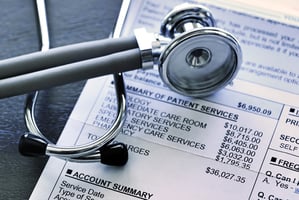Running a private practice already demands enough from you. Adding hours of administrative work on...


If your business provides a service, you should be paid for that service - and that includes private medical practices!
Especially for smaller practices or clinics, receiving payment from patients and insurance companies alike is often the core of your revenue, and if you aren’t being paid, your practice is losing money.
Whether you’re looking for help getting started or trying to get back on track with medical billing at your practice, you’ve come to the right place.
Here’s our breakdown of medical billing tips and guidelines for private medical practices:
One of the most prevalent pain points for smaller practices especially, is that many medical billing companies elect not to work with them, as they would be a much smaller account.
If smaller medical practices do end up working with a medical billing company, the billing companies charge a (sometimes very high) percentage on collections, which means that these small private practices are seeing less profit as a result of their billing partnerships. As a result, many providers choose instead to hire someone to handle these duties internally.
However, because of the ever-increasing complexity of medical billing due to strict rules surrounding considerations for Medicare, Medicaid, and veterans insurance providers, it can be difficult to find someone with the necessary qualifications, especially in rural areas.
The answer to this question is very simple: you have to get paid in order to keep your practice running. Ensuring efficiency in your revenue stream is crucial in order to pay for business expenses, employees, and providers.
As mentioned in the previous section, the majority of small practices opt to hire an employee to handle medical billing in-house, sometimes successfully - sometimes, not so successfully.
In order to ensure that your practice gets paid so that it can continue to run, the following two things are paramount:
All of this is not to say that medical practices cannot be successful with in-house medical billing, but rather that strong revenue cycle management, constant attention, and an experienced, qualified individual to manage these things, and that there might be an easier way.
The answer to this question is not nearly as simple as the last one. In some situations, medical practices find the perfect fit for the position of handling billing in-house, while in others, they aren’t as successful, for a number of potential reasons that differ from practice to practice.
This decision is one that should be made carefully, and based on how your practice could see increased efficiency and effectiveness in the medical billing process.
Some benefits to outsourcing medical billing include:
As you work on making the decision whether to stick with in-house medical billing services or to outsource them, there are a few steps you can take to improve efficiency regardless of which direction you choose. They include:
Though this is a lot of information to consume, medical billing is one of the absolutely most important aspects of running a private medical practice, so it is essential that you optimize your billing process as much as possible.
For more information on medical billing services, check out the 99MGMT Blog!


Running a private practice already demands enough from you. Adding hours of administrative work on...

Running a medical practice involves managing dozens of ongoing costs, and understanding them is...

A Texas physician opened a new practice with everything in place – staff hired, patients scheduled,...

Your biller is three weeks behind on claims. Two no-shows went unfilled this morning. Your office...

Every minute spent chasing paperwork or fixing scheduling issues is time taken away from patients....

Most physicians didn’t go through years of training to become billing experts, HR managers, or IT...

If your medical practice overhead seems to be eating into your revenue, you’re not alone. Research...

Marketing and referral strategies are part of running a private practice. In Texas, they come with...
.jpeg?height=200&name=alone-bills-calculator-1253591%20(1).jpeg)
Opening a medical clinic is rewarding – but it comes with upfront costs. Lease deposits. Equipment....

Ending a relationship with a patient isn’t something providers take lightly. But when certain...
Leave a Comment